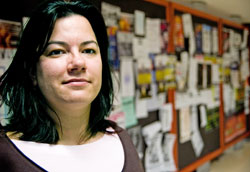ISO deluged with permit requests

Isabelle Lacelle prepares for a busy month at the International Students Office. Off-campus work permits are popular with our students.
Photo by Rob Maguire
Things at the International Students Office (ISO) are extremely busy these days, and they will likely get busier.
When the government introduced a program last April to allow full-time international students in good academic standing the opportunity to work up to 20 hours a week off campus during the academic terms, the ISO responded immediately.
“We made information sessions for interested students mandatory. Last May, we were offering two sessions a day for the whole month,” ISO coordinator Isabelle Lacelle said.
Lacelle hopes that the proactive approach helped Concordia’s 4,148 international students determine their eligibility. Some were unable to apply because of their course loads or averages. Others may have had other means to afford their studies.
“About 900 students applied for permits, almost double any other large institution in the province,” Lacelle said. Since her office only endorsed students who met the requirements, she’s fairly sure they all received the permits.
No one knows why the demand from Concordia was so high, even accounting for the large number of international students here. The ISO is planning a survey to learn where those students went to find work, how many were employed, and what types of work they found. They hope to have that information by the end of the term.
Meanwhile, the ISO staff is gearing up for another flurry of information sessions and applications, since students who began last January may become eligible for the permits in mid-November.
The program has required a lot of resource management. In addition to the information sessions, the ISO had to coordinate with the Registrar’s office, to determine students’ academic eligibility.
At the same time, international students are experiencing increased difficulty getting the study permits they need to come here in the first place. “It’s been tougher and tougher post 9/11,” Lacelle said.
Quebec is the only province that requires both provincial and federal permissions.
“We have a handbook that is mailed to each newly admitted student which informs them of all the steps they have to go through,” Lacelle said.
Lacelle estimates that it takes about two-and-a-half months for most people to get their paperwork in order. A lot of that time is spent having hard copies of letters and forms mailed to the appropriate offices and embassies here and in their own countries. Some countries also require medical exams or police checks.
Some students are having a harder time getting permission for their spouses and children to accompany them here. “These students are here for a long time,” Lacelle said. The ISO is there to help them as best they can.
The government often makes decisions on a case-by-case basis. A conference in November hosted by the Canadian Bureau for International Education in Quebec City will allow the ISO and similar groups on other campuses the opportunity to meet officials and ask about current policies.
That advocacy work is important to Lacelle. “We’ve been faced with a lot more work, but we pride ourselves in putting our students first.”